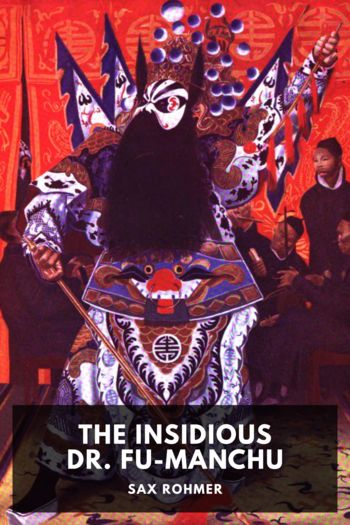The Insidious Dr. Fu Manchu - Sax Rohmer (best ebook reader TXT) 📗

- Author: Sax Rohmer
- Performer: -
Book online «The Insidious Dr. Fu Manchu - Sax Rohmer (best ebook reader TXT) 📗». Author Sax Rohmer
upon which he lay, his hands crossed upon his breast.
Transfixed with astonishment, I stood looking down upon him.
The wonders of the “Arabian Nights” were wonders no longer,
for here, in East-End London, was a true magician’s palace,
lacking not its beautiful slave lacking not its enchanted prince!
“It is Aziz, my brother,” said Karamaneh.
We passed down a stairway on to the floor of the apartment.
Karamaneh knelt and bent over the boy, stroking his hair
and whispering to him lovingly. I, too, bent over him;
and I shall never forget the anxiety in the girl’s eyes as she
watched me eagerly whilst I made a brief examination.
Brief, indeed, for even ere I had touched him I knew that the comely
shell held no spark of life. But Karamaneh fondled the cold hands,
and spoke softly in that Arabic tongue which long before I had divined
must be her native language.
Then, as I remained silent, she turned and looked at me,
read the truth in my eyes, and rose from her knees,
stood rigidly upright, and clutched me tremblingly.
“He is not dead—he is NOT dead!” she whispered, and shook me
as a child might, seeking to arouse me to a proper understanding.
“Oh, tell me he is not –”
“I cannot,” I replied gently, “for indeed he is.”
“No!” she said, wild-eyed, and raising her hands to her face as though
half distraught. “You do not understand—yet you are a doctor.
You do not understand –”
She stopped, moaning to herself and looking from the handsome
face of the boy to me. It was pitiful; it was uncanny.
But sorrow for the girl predominated in my mind.
Then from somewhere I heard a sound which I had heard before in houses
occupied by Dr. Fu-Manchu—that of a muffled gong.
“Quick!” Karamaneh had me by the arm. “Up! He has returned!”
She fled up the stairs to the balcony, I close at her heels.
The shadows veiled us, the thick carpet deadened the sound
of our tread, or certainly we must have been detected by the man
who entered the room we had just quitted.
It was Dr. Fu-Manchu!
Yellow-robed, immobile, the inhuman green eyes glittering catlike even,
it seemed, before the light struck them, he threaded his way through
the archipelago of cushions and bent over the couch of Aziz.
Karamaneh dragged me down on to my knees.
“Watch!” she whispered. “Watch!”
Dr. Fu-Manchu felt for the pulse of the boy whom a moment since I
had pronounced dead, and, stepping to the tall glass case,
took out a long-necked flask of chased gold, and from it,
into a graduated glass, he poured some drops of an amber liquid
wholly unfamiliar to me. I watched him with all my eyes,
and noted how high the liquid rose in the measure.
He charged a needle-syringe, and, bending again over Aziz,
made an injection.
Then all the wonders I had heard of this man became possible,
and with an awe which any other physician who had examined
Aziz must have felt, I admitted him a miracle-worker. For
as I watched, all but breathless, the dead came to life!
The glow of health crept upon the olive cheek—the boy moved—
he raised his hands above his head—he sat up, supported by
the Chinese doctor!
Fu-Manchu touched some hidden bell. A hideous yellow man with a scarred
face entered, carrying a tray upon which were a bowl containing
some steaming fluid, apparently soup, what looked like oaten cakes,
and a flask of red wine.
As the boy, exhibiting no more unusual symptoms than if he had just
awakened from a normal sleep, commenced his repast, Karamaneh drew me
gently along the passage into the room which we had first entered.
My heart leaped wildly as the marmoset bounded past us to drop hand
over hand to the lower apartment in search of its master.
“You see,” said Karamaneh, her voice quivering, “he is not dead!
But without Fu-Manchu he is dead to me. How can I leave him
when he holds the life of Aziz in his hand?”
“You must get me that flask, or some of its contents,” I directed.
“But tell me, how does he produce the appearance of death?”
“I cannot tell you,” she replied. “I do not know. It is something
in the wine. In another hour Aziz will be again as you saw him.
But see.” And, opening a little ebony box, she produced a phial
half filled with the amber liquid.
“Good!” I said, and slipped it into my pocket. “When will be the best
time to seize Fu-Manchu and to restore your brother?”
“I will let you know,” she whispered, and, opening the door, pushed me
hurriedly from the room. “He is going away tonight to the north;
but you must not come tonight. Quick! Quick! Along the passage.
He may call me at any moment.”
So, with the phial in my pocket containing a potent preparation unknown
to Western science, and with a last long look into the eyes of Karamaneh,
I passed out into the narrow alley, out from the fragrant perfumes
of that mystery house into the place of Thames-side stenches.
“WE must arrange for the house to be raided without delay,” said Smith.
“This time we are sure of our ally—”
“But we must keep our promise to her,” I interrupted.
“You can look after that, Petrie,” my friend said.
“I will devote the whole of my attention to Dr. Fu-Manchu!”
he added grimly.
Up and down the room he paced, gripping the blackened briar between
his teeth, so that the muscles stood out squarely upon his lean jaws.
The bronze which spoke of the Burmese sun enhanced the brightness
of his gray eyes.
“What have I all along maintained?” he jerked, looking back at me across
his shoulder—“that, although Karamaneh was one of the strongest weapons in
the Doctor’s armory, she was one which some day would be turned against him.
That day has dawned.”
“We must await word from her.”
“Quite so.”
He knocked out his pipe on the grate. Then:
“Have you any idea of the nature of the fluid in the phial?”
“Not the slightest. And I have none to spare for analytical purposes.”
Nayland Smith began stuffing mixture into the hot pipe-bowl,
and dropping an almost equal quantity on the floor.
“I cannot rest, Petrie,” he said. “I am itching to get to work.
Yet, a false move, and—” He lighted his pipe, and stood staring
from the window.
“I shall, of course, take a needle-syringe with me,” I explained.
Smith made no reply.
“If I but knew the composition of the drug which produced the semblance
of death,” I continued, “my fame would long survive my ashes.”
My friend did not turn. But:
“She said it was something he put in the wine?” he jerked.
“In the wine, yes.”
Silence fell. My thoughts reverted to Karamaneh, whom Dr. Fu-Manchu held
in bonds stronger than any slave-chains. For, with Aziz, her brother,
suspended between life and death, what could she do save obey
the mandates of the cunning Chinaman? What perverted genius was his!
If that treasury of obscure wisdom which he, perhaps alone of living men,
had rifled, could but be thrown open to the sick and suffering, the name
of Dr. Fu-Manchu would rank with the golden ones in the history of healing.
Nayland Smith suddenly turned, and the expression upon his face amazed me.
“Look up the next train to L—!” he rapped. “To L—? What—?”
“There’s the Bradshaw. We haven’t a minute to waste.”
In his voice was the imperative note I knew so well; in his
eyes was the light which told of an urgent need for action—
a portentous truth suddenly grasped.
“One in half-an-hour—the last.”
“We must catch it.”
No further word of explanation he vouchsafed, but darted off to dress;
for he had spent the afternoon pacing the room in his dressing-gown
and smoking without intermission.
Out and to the corner we hurried, and leaped into the first taxi
upon the rank. Smith enjoined the man to hasten, and we were off—
all in that whirl of feverish activity which characterized my friend’s
movements in times of important action.
He sat glancing impatiently from the window and twitching at the lobe
of his ear.
“I know you will forgive me, old man,” he said, “but there
is a little problem which I am trying to work out in my mind.
Did you bring the things I mentioned?”
“Yes.”
Conversation lapsed, until, just as the cab turned into the station,
Smith said: “Should you consider Lord Southery to have been the first
constructive engineer of his time, Petrie?”
“Undoubtedly,” I replied.
“Greater than Von Homber, of Berlin?”
“Possibly not. But Von Homber has been dead for three years.”
“Three years, is it?”
“Roughly.”
“Ah!”
We reached the station in time to secure a non-corridor
compartment to ourselves, and to allow Smith leisure carefully
to inspect the occupants of all the others, from the engine
to the guard’s van. He was muffled up to the eyes, and he warned
me to keep out of sight in the corner of the compartment.
In fact, his behavior had me bursting with curiosity.
The train having started:
“Don’t imagine, Petrie,” said Smith “that I am trying to lead you
blindfolded in order later to dazzle you with my perspicacity.
I am simply afraid that this may be a wild-goose chase.
The idea upon which I am acting does not seem to have struck you.
I wish it had. The fact would argue in favor of its being, sound.”
“At present I am hopelessly mystified.”
“Well, then, I will not bias you towards my view.
But just study the situation, and see if you can arrive at
the reason for this sudden journey. I shall be distinctly
encouraged if you succeed.”
But I did not succeed, and since Smith obviously was
unwilling to enlighten me, I pressed him no more.
The train stopped at Rugby, where he was engaged with
the stationmaster in making some mysterious arrangements.
At L—, however, their object became plain, for a high-power car
was awaiting us, and into this we hurried and ere the greater
number of passengers had reached the platform were being driven
off at headlong speed along the moon-bathed roads.
Twenty minutes’ rapid traveling, and a white mansion leaped into the line
of sight, standing out vividly against its woody backing.
“Stradwick Hall,” said Smith. “The home of Lord Southery.
We are first—but Dr. Fu-Manchu was on the train.”
Then the truth dawned upon the gloom of my perplexity.
“YOUR extraordinary proposal fills me with horror, Mr. Smith!”
The sleek little man in the dress suit, who looked like a head waiter
(but was the trusted legal adviser of the house of Southery)
puffed at his cigar indignantly. Nayland Smith, whose restless
pacing had led him to the far end of the library, turned, a remote
but virile figure, and looked back to where I stood by the open
hearth with the solicitor.
“I am in your hands, Mr. Henderson,” he said, and advanced
upon the latter, his gray eyes ablaze. “Save for the heir,
who is abroad on foreign service, you say there is no kin
of Lord Southery to consider. The word rests with you.
If I am wrong, and you agree





Comments (0)